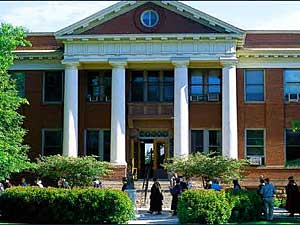|
Audio
Photos
Resources
Your Voice
|
Minnesota colleges grapple with campus SARS policies
May 12, 2003
 |
| Laird Hall on the Carleton College campus, where officials recently dealt with a suspected case of SARS. "It was intense," says Dean of Students Mark Govoni. (Photo courtesy of Carleton College) |
St. Paul, Minn. — Reports of illnesses from SARS -- Severe Acute Respiratory Syndrome -- forced some Minnesota colleges to cut short their Asian study abroad programs and recommend students return to the U.S.
Most students returned to their respective homes around the country. But officials at Carleton College in Northfield found themselves struggling to handle six students who opted to return to campus.
Dean of Students Mark Govoni says the situation presented many challenges.
"It was intense. We had to terminate the program and bring them back, effectively, in the middle of the term. The logistics to that alone would be difficult, let alone the issues related to SARS and the public apprehension," says Govoni.
|
If this had originated in the United States or originated in Toronto, I don't think it would have the same news value as the fact that it originated in China or in Asia. ... I think there's a little bit of an Asian phobia going on here.
- Eugene Allen, U of M's Office of International Programs |
Within 24 hours of returning to campus, one unnamed student came down with a low-grade fever and was classified with "suspect" SARS. Campus officials followed federal health guidelines and put him in quarantine for 10 days. The other five who came to campus with him were in isolation for 72 hours.
Govoni says the student never developed full-blown SARS, and now looks good and feels fine.
But he says the possibility of having just one student with SARS taxed university resources. For instance, the college provided the student with separate housing, food, medical care and entertainment.
It's this kind of stretching of financial, medical, and housing resources that compelled University of California at Berkeley officials to announce they would bar as many as 600 students from China, Hong Kong, Taiwan, and Singapore from attending summer session classes.
The decision was controversial, and Berkeley officials backed off slightly, announcing over the weekend they will allow an estimated 80 foreign students from areas with significant SARS outbreaks to attend summer classes.
June Noronha, associate dean for Multicultural Education at the College of St. Catherine in St. Paul, is past president of the Association of International Educators. She says she's not comfortable second-guessing Berkeley's decisions. She says it's difficult for colleges and universities to make policy because information about SARS changes weekly, if not faster.
"We have to be checking every week to see what's going on in many of these countries -- which countries have been cleared, which countries have more cases, and where in the countries are the cases. So it's a moving target, I would say," says Noronha.
University of Minnesota officials say their current SARS policy involves bringing home students from Asian study abroad programs, and recommending no travel to SARS-affected regions unless necessary. There are no plans to follow Berkeley's model, or ban any students from campus.
The highest number of international students at the U are from China -- about 700 students.
Eugene Allen, executive director of the U's Office of International Programs, says while it's understandable that schools are being cautious, it's also important to not overreact.
"If this had originated in the United States or originated in Toronto, I don't think it would have the same news value as the fact that it originated in China or in Asia," says Allen. "Because we've heard of the Asian flu, we've heard of Hong Kong flu ... I think there's a little bit of an Asian phobia going on here."
Allen says like most universities around the country, the U will continue to monitor the Centers for Disease Control and Prevention's Web site for information, and follow its recommendations.
Meanwhile, most international students in Minnesota who came from SARS-affected countries are not returning home for the summer. They not only fear getting the disease, they also worry about being able to get back into the U.S. in time for the start of fall classes.
|
News Headlines
|
Related Subjects
|
